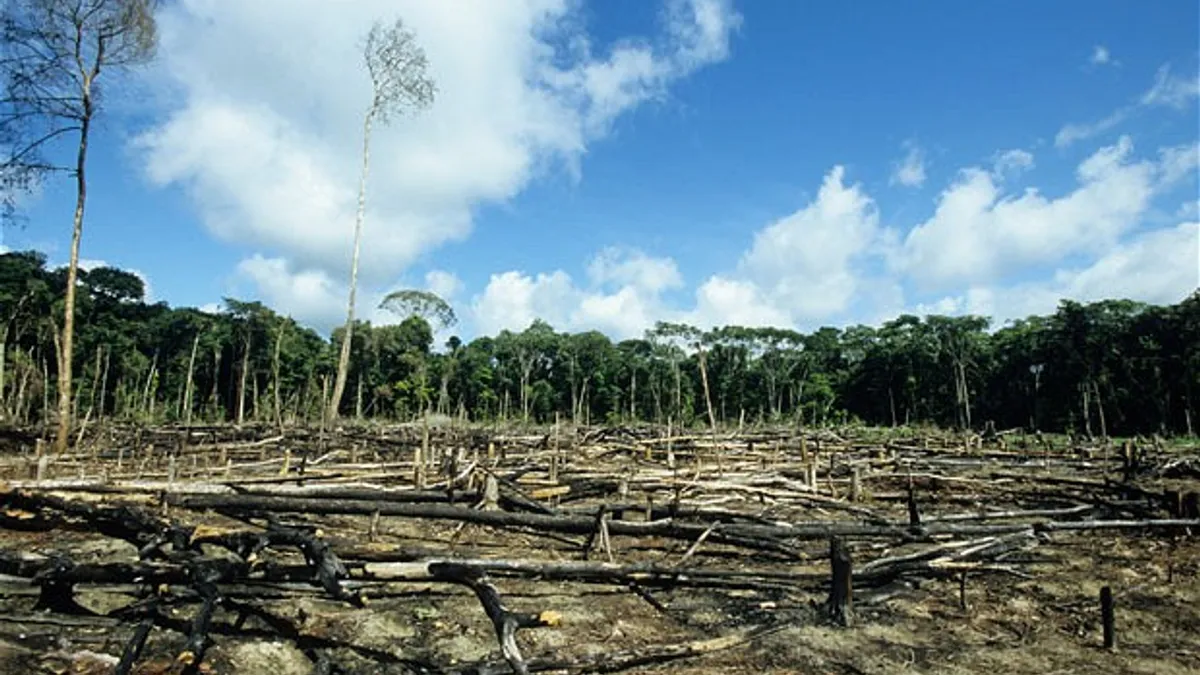Dive Brief:
- Nestlé has achieved 77% of its goal to achieve zero deforestation within the supply chain of its agricultural commodities, according to a release. In 2010, the company made a commitment of no deforestation by 2020.
- The Swiss company developed Starling, a system that uses satellite imagery to identify areas at risk of deforestation, and is now using it to monitor its entire palm oil supply chain. The company plans to extend the service to check for deforestation in pulp and paper, as well as soy later in 2019. Nestlé also published a Transparency Dashboard that uses Starling data to show information on deforestation trends.
- Nestlé has called upon other manufacturers to adopt satellite monitoring services to increase transparency within their own supply chains. Bastien Sachet, CEO of Earthworm Foundation, said in the release that more publicly available information about deforestation and supply chains "will allow consumers and investors to really see which companies are truly walking the talk."
Dive Insight:
Satellite imagery has given deforestation a whole new face. In 2017, The New York Times used it to show how deforestation was spreading through the Amazon rainforest, and was able to link actions to soy suppliers that work with Cargill. Companies are now trying to get ahead of similar issues, and Nestlé is employing these technological capabilities to showcase its progress to consumers.
Deforestation is a hot topic as climate change is heating up landscapes around the world and shifting agricultural production away from ancestral homelands. Palm oil production — Nestlé’s primary focus with this technology — has been identified as a major contributor to climate change and a key driver of biodiversity loss. According to the Rainforest Action Network, palm oil is the most used vegetable oil in the world, and one of the most common ingredients in U.S. food products.
This milestone of achieving 77% zero-deforestation in its supply chain comes on the heels of the Swiss company's announcement in February, when Nestlé and Unilever became the first global food companies to publish their entire palm oil supply chains for consumers. Such transparency and traceability, as outlined in the 2017 Reporting Guidance on Palm Oil, are essential to halting deforestation. However, less than 1% of companies have traceability commitments covering the biggest commodities they impact, according to Ceres data.
By making its supply chain an open book, Nestlé is generating a competitive advantage both with investors and customers. Investors, who are concerned that climate and deforestation risk could harm the companies they've put money into, recently sent a letter to those involved in the soy trade, asking them to stop deforestation throughout the supply chain. Having satellite imagery that can track areas vulnerable to deforestation and verify the company's compliance with its zero-deforestation goals is valuable.
As for consumers, the demand for sustainable, traceable food is growing. Consumers are willing to pay more for products that meet those standards. Even those who aren't as concerned with sustainability now may see their opinions change if the cost of the product skyrockets because of dwindling supplies impacted by climate change.
However, the conundrum of deforestation is larger than something Nestlé can tackle on its own. Collaboration between farmers, suppliers, manufacturers and consumers will be key if deforestation is going to be combated entirely. If this pledge and dashboard helps the company gain loyal consumers, Nestlé's transparency could pressure more companies to do the same.














